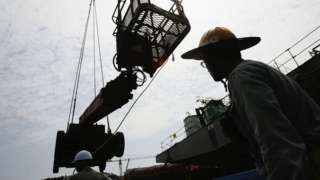South Korea’s government has unveiled new stimulus measures following a raft of disappointing economic data for the export-dependent nation. The stimulus package will include an extra 6tn Korean won ($4.94bn; £3.42bn) in public spending. It will also include an extension of existing tax cuts on cars. Overall, the package will see an additional 21tn won of spending in the first quarter, the Yonhap news agency said.
South Korea, Asia’s fourth largest economy, has been hit by slowing global growth, falling oil prices, and softer demand out of China, one of its most important trading partners. The latest stimulus measures, which will also see cheaper loans made available to some local companies, are designed to help boost exports and domestic demand.
Disappointing trade numbers released on Monday showed exports contracted 18.5% in January from a year earlier. It marked the 13th month in a row the nation’s exports had fallen and was the worst result for exports since mid 2009. South Korea’s annual inflation rate also cooled to its lowest in four months in January. Official numbers released in January showed the economy expanded in 2015 at its slowest pace in three years – growing 2.6% from a year earlier. The central bank has now revised down its forecast for growth in 2016 from 3.2% to 3.0%.
Further still, South Korea is facing high levels of youth unemployment. “The government will mobilise all available means and resources in order to boost domestic consumption and exports in the first quarter to March and to help create new jobs,” Yonhap quoted the ministry as saying. South Korea’s economy was in part held back last year by the effects of the deadly Mers virus which affected tourism and domestic spending in the first half of the year.


